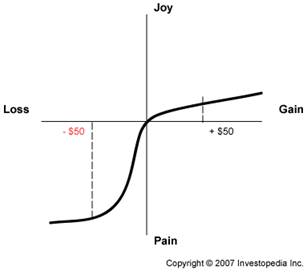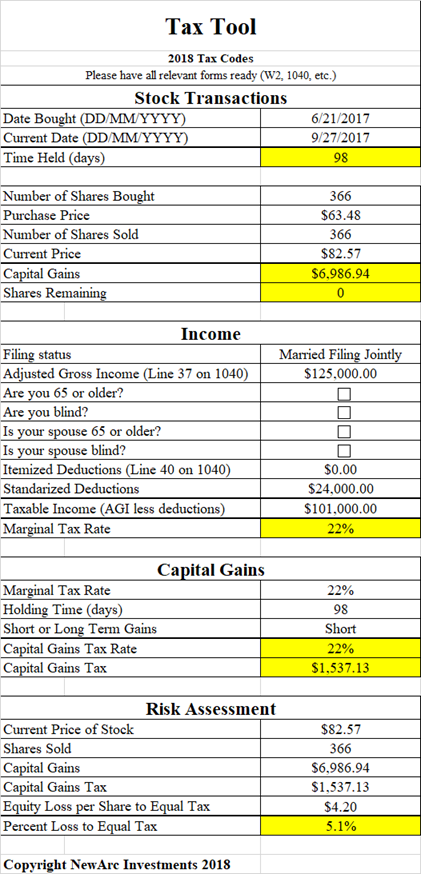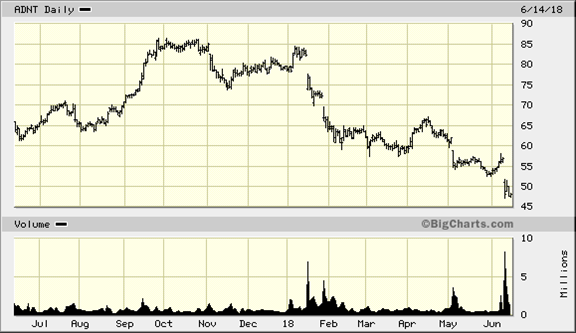The extended market rally has left many investors with significant gains in their holdings. This raises an important decision: Is it time to sell, and pay the taxes?
While the right answer depends upon your personal circumstances, my objective is to help you think about the problem in the right way.
The Bias Against Selling
People do not particularly like to pay taxes, and often accumulate very large (and dangerous) positions to avoid the tax man. Behavioral economics has analyzed the psychology, and the conclusions have broad acceptance. Here are two key conclusions of the Kahneman and Tversky research, summarized nicely by Nathan Reiff:
1. You have $1,000 and you must pick one of the following choices:
Choice A: You have a 50% chance of gaining $1,000, and a $50 chance of gaining $0.
Choice B: You have a 100% chance of gaining $500.
2. You have $2,000 and you must pick one of the following choices:
Choice A: You have a 50% chance of losing $1,000, and a 50% chance of losing $0.
Choice B: You have a 100% chance of losing $500.
If these questions were to be answered logically, a subject might pick either “A” or “B” in both situations. People who are inclined to choose “B” would be more risk adverse than those who would choose “A”. However, the results of the study showed that a significant majority of people chose “B” for question 1 and “A” for question 2.
He nicely illustrates the resulting psychology.

This is called prospect theory, with the emphasis on avoiding risk, even when expected value is different. I see a bias toward certainty – claiming the certain gain and avoiding the certain loss. One is easy to see and the other is a theoretical computation. I call this perception dichotomy. The concept has many applications.
The Trading Mentality
Those with a trading (or gambling) psychology are inclined to take profits. If you can take out the amount of your original investment, you are playing on the “house’s money.” While traders would take profits as big gains occur, it is not helpful for the typical investor decision:
- The action is psychological, not analytical. One you have winnings it is your money, not the house’s.
- It does not address the tax question.
The Issue
The problem is that the investor is confronted with a known tax bill and an uncertain result if he/she continues to hold the appreciated stock. This is a comparison that plays right into the psychological bias, often leading investors to the wrong conclusion.
Problems like this are often easier to understand with an example in mind. This post was inspired by a specific client discussion from last year. We bought a stock in one of our programs, one where we continually update earnings estimates and our price targets. Sometimes there is a gradual improvement in earnings, and our price target moves higher. Sometimes we are wrong, so we sell and move on. Occasionally we catch a quick move, where the stock rapidly rises to our target. Here is an example of that type of winner. We bought 366 shares for the client (and proportional amounts for many others in the program) at $63.48. Fewer than 100 days later the stock was trading at $82.57, our approximate target. We had three basic choices:
- Hold until we could get long-term capital gains treatment—a lower rate.
- Sell part, an easy action to explain to a client.
- Sell all and pay the tax.
The last choice is the most difficult for many to understand and also for advisors to explain.
Defining the results
I use a straightforward calculation which we have now formalized into a Tax Tool. Here is what it showed in this case.

The tool does not provide a definitive answer, but it does highlight the key comparison. For this investor, a 5% decline in the stock is the dollar equivalent of paying the tax. Actually, it is worse. If the stock declines, the investor still faces the tax decision – now with a smaller gain.
This approach does not determine – or even recommend – a decision. It is intended to clarify the choices so that people can escape the biases proven in behavioral economics. Investors with a higher tax rate would have a higher “loss level” as the breakeven point. Each investor is different.
Those with a huge legacy position from an inheritance or an employee investment program have a very important and special problem. There are various ways to hedge the downside of these positions, but the topic is beyond the scope of this post.
Aftermath
You may be curious about how this all played out. In this case, our decision to sell was clearly right (and also correct). It was easier to execute and to explain because of our tax analysis.

It is very difficult to sell a stock when your former gains are eroding, and you still face taxes.
[Special thanks to our summer intern, Vanderbilt student Eric Lo, for his help in implementing the tax tool.]
